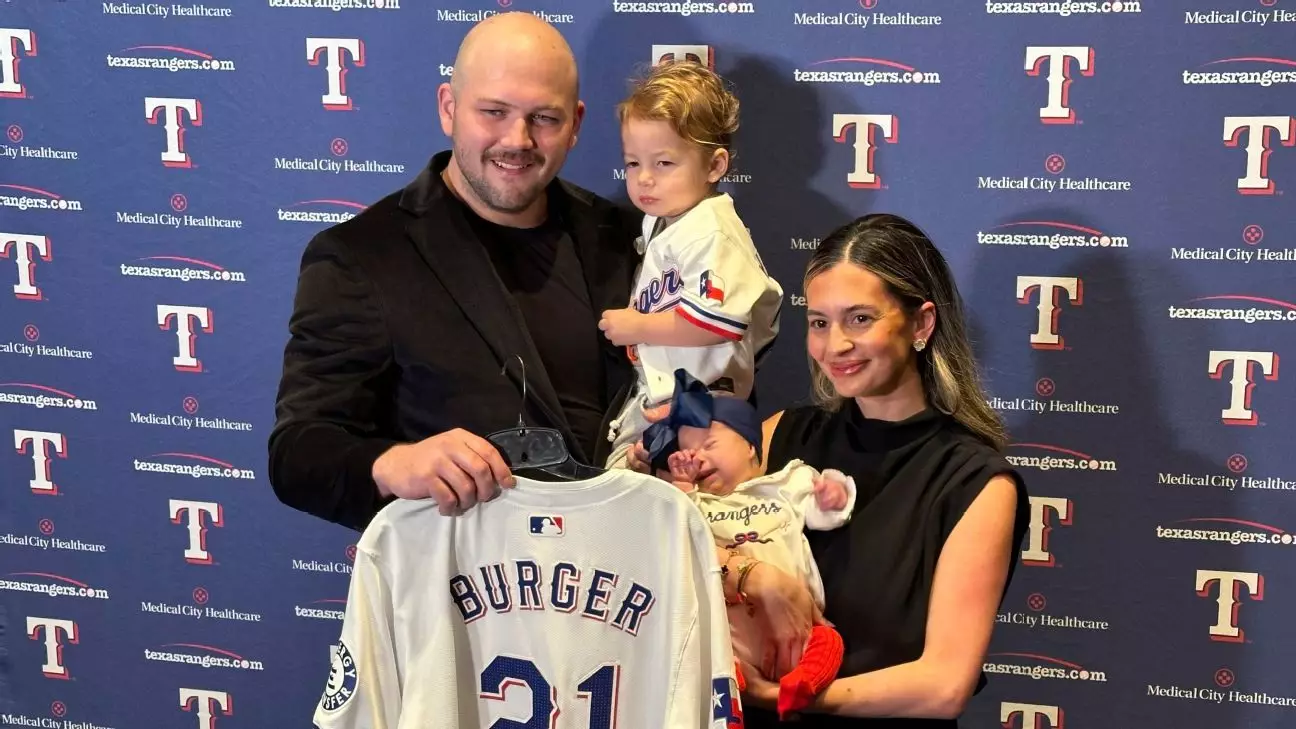In the world of sports, moments of triumph often emerge from the most unexpected circumstances. Early in the spring training season, a particular home run hit by Jake Burger of the Texas Rangers transcended the simple joy of scoring points; it carried a profound emotional weight that resonated far beyond the baseball diamond. This article delves into the poignant backdrop behind Burger’s two-run homer, illustrating how personal struggle can intersect with professional achievement and what it means to find hope in extraordinary situations.
Jake Burger’s recent weeks created a narrative of resilience that is as moving as it is unbelievable. Springer was away from his team, immersed in the anxiety of watching his four-month-old daughter, Penelope, undergo open-heart surgery at Vanderbilt Children’s Hospital. This moment was not merely a medical procedure; it was the culmination of an emotional rollercoaster experienced by Burger and his wife, Ashlyn. Born with Down syndrome, Penelope faced physical challenges from the outset, and her surgery was a critical step toward improving her quality of life. As Burger explained, the family was acutely aware of what lay ahead, yet nothing could truly prepare them for the emotional toll of waiting during the surgery.
The experience symbolizes the vulnerable side of parenthood—where faith becomes a lifeline. As Burger reflected on the intensity of that waiting room, he acknowledged the spiritual and emotional growth that came from his experience. In stark contrast to the pressure cooker of professional sports, the surgery was a stark reminder of what is truly important in life. Notably, this personal struggle only enhanced the significance of his return to the field.
Burger’s return to the Texas Rangers on the day following his daughter’s surgery represented not just a physical return to the game, but a powerful symbolic message about perseverance. As he stepped up to the plate against the Seattle Mariners, the anticipation that filled the air was palpable. Fans and teammates alike knew the emotional gravity of Burger’s journey, building an atmosphere that seemed charged with hope. His fifth-inning home run off pitcher Blas Castano was thus imbued with deeper meaning; it felt like not just a contribution to the game, but a triumph over one of life’s daunting challenges.
Burger’s choice to wear Penelope’s hospital band as he batted is a testament to how deeply personal struggles can intertwine with professional endeavors. It reflects a consciousness about prioritizing family and faith over the often superficial narrative that can dominate the world of sports. “Maybe that’s the secret sauce there,” he joked post-game, hinting at the serendipity that sometimes accompanies moments of great significance.
As if to crown this moment of personal triumph, Burger adopted the number 21 for his jersey—a deliberate nod to trisomy 21, the clinical term for Down syndrome. Through this gesture, Burger has not only honored his daughter but also embraced his role as a voice for others navigating similar challenges. In a society that often views disabilities through a binary lens of limitation and difficulty, Burger’s decision to wear the number embodies a spirit of advocacy and awareness.
The impact of such a public declaration can’t be understated. By normalizing conversations around Down syndrome, Burger has positioned himself as an ambassador for change, challenging stereotypes, and fostering understanding. It sends a message to families in similar circumstances: they are not alone, and their journeys, no matter how challenging, can lead to moments of incredible beauty, just like his home run.
As fans celebrated Burger’s successful at-bat, the echo of his journey resonated loudly within the walls of the stadium. In that singular event, sports became more than just a game; they morphed into a platform for dialogue and a means for empathy among fans, players, and families alike. The intersectionality of personal lives and professional careers is often overlooked in sports, and Burger’s experience serves as a poignant reminder of the compassion and humanity hidden behind athletic achievements.
In closing, Jake Burger’s story stands as an extraordinary narrative of hope and resilience. It is not merely about a home run for the Texas Rangers; it symbolizes the potential for healing, the strength of familial bonds, and the profound impact of advocacy. As the season progresses, Burger continues not just to play baseball but to inspire, reminding us all of the things worth fighting for, both on and off the field.

